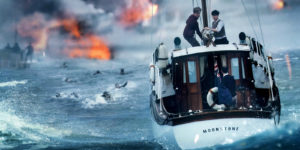 Christopher Nolan’s Dunkirk, which depicts the evacuation of the British Expeditionary Force in May 1940 from France, is a visual and auditory masterpiece, but it’s not for the faint of heart. Starting from the opening moments, with only the barest of credits to initiate the proceedings, the audience endures just under two hours of virtually non-stop action in which life hangs by a thread. Despite what Nolan chose to leave out, such as explicit carnage or, with one exception, all visual evidence of the Germans, the movie depicts as well as any film in recent memory the terror and helplessness of modern war. After seeing it, a viewer can expect to be utterly exhausted, and the origins of post-traumatic stress disorder will no longer be a mystery.
Christopher Nolan’s Dunkirk, which depicts the evacuation of the British Expeditionary Force in May 1940 from France, is a visual and auditory masterpiece, but it’s not for the faint of heart. Starting from the opening moments, with only the barest of credits to initiate the proceedings, the audience endures just under two hours of virtually non-stop action in which life hangs by a thread. Despite what Nolan chose to leave out, such as explicit carnage or, with one exception, all visual evidence of the Germans, the movie depicts as well as any film in recent memory the terror and helplessness of modern war. After seeing it, a viewer can expect to be utterly exhausted, and the origins of post-traumatic stress disorder will no longer be a mystery.
There are plenty of reviews online that dissect Dunkirk’s cinematic qualities and faithfulness to the historical record, but it is worth mentioning that the significance of the Dunkirk evacuation went beyond the survival of the British Tommies waiting on the beach. As it was taking place, the British War Cabinet, with Winston Churchill only days in office as Prime Minister, debated the prospect of reaching out to the Nazis for a negotiated peace. As John Lukacs writes in his book, Five Days in London, the mood of the War Cabinet and the Conservative Party was far from unanimous on this question despite Churchill’s subsequent oratory about fighting on the beaches. The more popular Foreign Secretary Lord Halifax wanted negotiations, and it took all of Churchill’s political skill to prevent them. If the evacuation had failed, with hundreds of thousands of British soldiers massacred on the Dunkirk beach or marched off into captivity, it would have dramatically increased the likelihood that Halifax would have prevailed. The British would have signed off on a peace leaving Hitler in undisputed control of Europe, with consequences we can only imagine for our world today.
Something to think about, perhaps, if you plan on seeing Dunkirk. On the other hand, you might find the movie stressful enough as it is.


